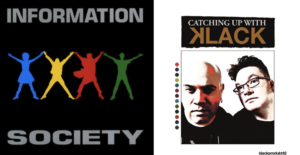Quick refresher on this semi-regular feature here at I Die: You Die; A Game Called Echo is the thing where we recommend a more recent album you might enjoy if you’re a fan of a classic record. That’s it, basic as it gets.

Bel Canto’s sophomore record is a masterpiece which straddles many genres, darkwave amongst them. Its blend of tasteful acoustics, immediate yet atmospheric synths, and elegant vocals can easily be claimed as dream pop, ethereal, and possibly even new age, but those same elements combine to form top shelf darkwave on Birds Of Passage as well, be it the sober and fateful bombast of “Dewy Fields” or the slow-burn perfection of “A Shoulder To The Wheel”, its ever building synth strings and harmonics making it an enduring classic on goth dancefloors, perfect for your own version of the “I’m a shrub/I’m a tree” or “picking the apple” dances. Birds Of Passage‘s power comes as much from its understatement as its hooks, with pieces like “Intravenous” and “Time Without End” lighting their own little candles and waiting for passers-by to be drawn in by their grace, and that’s often the mark of maturity many darkwave also-rans miss out on, separating those who overplay their hand with garish programming from those capable of leaving something left unsaid, or at least nestling it mysteriously in the mix.
An interest in chilly atmospheres is certainly something Greek duo Hada have in common with Bel Canto, and at least in terms of titling with their debut White Out Conditions. But In The Heart Of An Endless Winter feels closer to Birds Of Passage‘s mix of pop melody and ambient minimalism than the latter’s folktronic experimentation. From the hammered strings of opener “White Sister” through the almost sacred piano of “Mon Ami de la Planète Bleue”, that sense of a gracious and inviting space from which to mull over the passing of seasons and mortality is created, but with hooks to boot. The speedy ease with which post-punk guitars skate along ice on “Neurons” has a laid back charm, and the kosmische arpegios of “Ascent Of The Blessed” are quite similar to the worldbeat pulse of “Birds Of Passage”. But as with Bel Canto, it’s in knowing when to lay back in the cut and allow the world that they’ve designed to turn of its own accord that In The Heart Of An Endless Winter truly excels.

Information Society’s self-titled debut LP is an important touchstone in the transition from eighties synthpop to broader worlds of electronic music. While the record is largely remembered for the damnably funky singalong “”What’s on Your Mind (Pure Energy)” and it’s distincting use of Star Trek vocal samples, the nearly 8 minute long “Running” was already a hit in New York dance clubs before the album’s release, a track that can be read as classic electro, new wave, or freestyle depedning on context. The secret to the album’s Gold sales at a time when synthpop was broadly on the decline was that while it maintained the genre’s focus on big melodies, it integrated b-boyisms, nods to house and techno (presaging the sounds that would rocket EMF and Jesus Jones to chart success), and the classic electro-pop of Kraftwerk, the sweat of DAF, and Art of Noise’s mix of humour and the avant-garde. The album doesn’t sound particularly dated despite being squarely planted at its exact moment of release simply because it kept danceability and good-old fashioned songcraft at its heart.
Madison Wisconsin’s Klack started off as a fun one-off by friends Eric Oehler and Matt Fanale of Null Device and Caustic respectively, an avenue for them to explore an interest in New Beat and body music sounds that didn’t necessarily fit into the synthpop and industrial of their respective main projects. A listen to 2020’s Catching up with Klack, a collection of basically everything they had released up til that point, should allow anyone to draw the line from Insoc to their work; early cuts like “DMF” have the same mix of samples and body-moving rhythm programming, while a number like “With Precision” gets across their knack of instantly hummable hooks that don’t skimp on dancefloor appeal. Listen to how “The Games We Play” weaves Oehler’s voice with touches of acid and disembodied voices from classic education videos, or how “Time 1.1” works its message of unity against an arrangement of swelling synths and rolling kicks – no matter the cut, Klack keep their focus on keeping songs easy and fun on the first listen to the fiftieth. Like Information Society they touch on any number of now-retro genres (check the classic house piano on “Check the Spreadsheet” and the NRG fit for a mastermix that flows through “Synthesizer (v2.0)”), but it’s the songs that matter.





